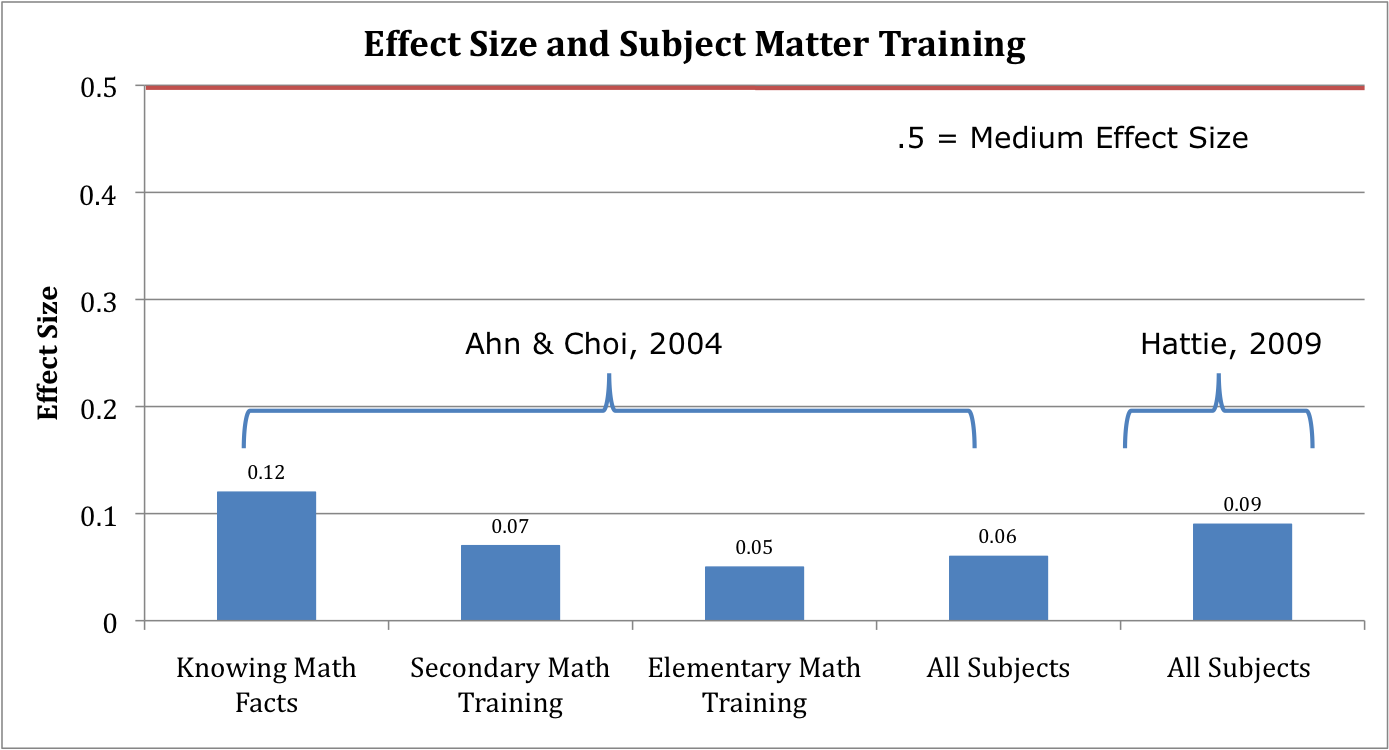How important is it for teachers to receive subject matter training in order to obtain a teaching credential?
Why is the question important? Common wisdom and logic tell us that to be a successful teacher one must have training in the subject area in which one will teach. This belief is so prevalent it is required of the National Board for Professional Teaching Standards (NBPTS), teacher preparation accreditation, and since 2001 enshrined in law. Beginning with No Child Left Behind (ESEA) subject matter competency has been key to how we define a “highly qualified” teacher. Since we are spending millions of dollars and thousands of teacher preparation hours meeting this standard, it is important that we ask the question, does subject matter training make better teachers and result in improved student achievement?
See further discussion below.

Source(s): (1) Teachers’ subject matter knowledge as a teacher qualification: A Synthesis of the quantitative literature on students’ mathematics achievement (2004), and (2) Visible Learning: A Synthesis of over 800 Meta-analyses Relating to Achievement, 2009
Results: The Ahn and Choi review of the literature and meta-analysis found little consistent evidence supporting subject matter training as essential for improving teacher performance. This conclusion was again supported in 2005 American Educational Research Association (AERA) book Studying Teacher Education. AERA concluded that subject matter training only provides a small impact for teachers of secondary mathematics. Otherwise, subject matter played an insignificant role for elementary mathematics teachers and teachers of other course areas. John Hattie, 2009 in his examination of the topic similarly found a very small effect size .09 (d) and little support subject matter as integral to effective teacher preparation.
Implications: The conclusion is for educators to continue to build the knowledge base on what is important in the development of competent and effective teachers. Current research has identified skills areas that are much more productive for teachers. We know that formative assessment, active teaching, classroom management, and well-constructed curricula are effective at improving student performance. Teacher preparation should pay more attention to what works and less to those areas we have evidence that does not work. We should update our definition in federal law, ESEA to reflect the growing body of evidence in the area of subject matter training.
Author(s): (1) Soyeon Ahn and Jinyoung Choi and (2) John Hattie
Publisher(s): (1) Presented at the American Educational Research Association and Routledge
Study Description: Ahn and Choi literature review with the focus on the topic of mathematics identified a total of 41 studies. These include 8 journal articles, 1 book chapter, 7 research reports, 1 conference proceeding, and 24 dissertations. These quantitative studies were included in a meta-analysis and the data analytic techniques used in the study were: (a) correlation analysis, (b) regression, (c) hierarchical linear modeling (HLM) , and (d) group comparison techniques such as analysis of variance and analysis of covariance. The purpose of the study was to attempt to identify those variables that impact subject matter training in order to understand how to more effectively train teachers.
The Hattie, 2009 analysis offered a broader focus on the topic. It included two meta-analyses of 92 studies in the area of subject matter teacher preparation.
Definitions:
- Hierarchical linear modeling (HLM): Provides a conceptual and statistical process based upon simple linear regression and multiple linear regression designed for investigating and drawing conclusions regarding the influence of phenomena at different levels of analysis. The benefit of using HLM is its ability to provide insight when multiple variables are simultaneously affecting the issue being studied.
- Subject matter: Training teachers receive in the area they will teach. Common knowledge says that to teach a subject, the teacher must first have an understanding and be acquainted about what they will be teaching. Knowledge of the topic area in which a teacher is teaching include; history, science, mathematics, etc
Citation(s): (1) Ahn, S., and Choi, J., Teachers’ subject matter knowledge as a teacher qualification: A Synthesis of the quantitative literature on students’ mathematics achievement (2004) and (2) Hattie, J., Visible Learning: A Synthesis of over 800 Meta-analyses Relating to Achievement (2009)
v
